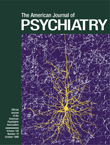Expressed Emotion and Clinical Outcome in Borderline Personality Disorder
Abstract
OBJECTIVE: This longitudinal follow-up study examined the predictive validity of relatives’ expressed emotion in a group of patients diagnosed with borderline personality disorder. METHOD: Thirty-five patients with DSM-III-R-diagnosed borderline personality disorder were followed up 1 year after they were discharged from a psychiatric hospital. Clinical outcome was assessed through interviews with patients and their family members. Expressed emotion in the patients’ relatives, assessed at the time of the index admission, was then used to predict patients’ subsequent clinical outcomes. RESULTS: Contrary to prediction, relatives’ criticism and hostility did not predict how well patients did in the year after discharge. Neither did they predict rates of rehospitalization. Clinical outcome was strongly associated with family levels of emotional overinvolvement, however. Patients whose families scored higher on emotional overinvolvement had better clinical outcomes over the course of the follow-up period. CONCLUSIONS: These findings suggest that the association between expressed emotion and patient outcome may be different for patients with borderline personality disorder than it is for patients with schizophrenia or mood disorders.



